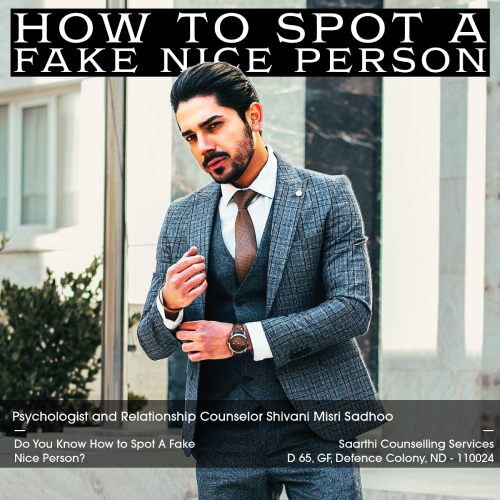Unveils Psychologist and Relationship Counselor Shivani Misri Sadhoo
Individuals often present their most favourable characteristics in social settings, concealing their authentic selves in a quest for acceptance and validation. In a world where genuine kindness is a rare gem, it’s disheartening to encounter individuals who wield a façade of niceness to further their own agendas. These so-called “fake nice” people can leave us feeling perplexed and deceived.
So, the question then arises: How can we distinguish genuine warmth from the artificial?
Eminent psychologist and relationship counsellor Shivani Misri Sadhoo shares tips and tricks to identify a “fake nice person” in this article.

What are the signs of a fake nice person?
Shivani Sadhoo, says, though it is not that easy to say from the first glimpse, if you are a bit of an observant nature, you will soon be able to spot those signs. Here are some of them as explained below.
Mask of Nicety
Individuals who are insincere in their intentions often put on a show of friendliness, masking their true feelings. They use false compliments, deceptive acts of kindness, and hidden agendas to manipulate situations. Their excessive promises or harsh judgments of others further reveal their lack of genuineness.
Humble Bragging
They often engage in “humble bragging,” where they subtly boast about their achievements or qualities while appearing modest. This manipulation masks their true intentions. For instance, saying “I can’t believe I got a promotion again, I really don’t deserve it” is a humble brag, as it highlights success while feigning humility, revealing their desire to showcase accomplishments under the guise of modesty.
Inconsistent actions
Human behavior is complex, but patterns reveal truths. True well-wishers demonstrate compassion not only when it suits them but also during challenging moments. In contrast, the fake nice person tends to be selective, reserving their charm for circumstances where they can reap benefits. Observing their behavior during adversity and prosperity can thus reveal the sincerity of their intentions.
Overly Apologetic
Fake nice individuals tend to go overboard with apologies. While genuine kindness involves sincere remorse when causing inconvenience, fake nice people excessively apologize, often for trivial matters. This could be an attempt to mask insincerity or manipulate perceptions. Authenticity is crucial in interpersonal interactions, where excessive apologies might signal a hidden agenda rather than genuine concern.
Insincere Flattery
When someone consistently praises without apparent reason, they may be engaging in insincere flattery. These fake nice people use sugar-coated words to manipulate, creating a façade of friendliness for self-serving purposes. They aim to gain favor without establishing genuine relationships through their actions. If the compliments seem too over-the-top and inappropriate, they likely are.
Being Judgmental
Beneath their friendly exterior, fake nice individuals harbor strong judgmental tendencies. They skilfully mask negativity with pleasantness, like someone who praises a co-worker publicly but criticizes them privately. These people excel at assessing others’ utility and swiftly categorize them as valuable or insignificant. They avoid those who won’t benefit them, swiftly forming opinions without investing time.
Avoid Voicing Opinions
Such people choose to remain silent instead of expressing their genuine opinions, often concealing their true selves. This silence serves to mask their true intentions, creating an impression of agreeability while internally harboring differing perspectives.
False Promises
Fake nice people often engage in making grand promises that they ultimately fail to fulfill. These individuals pretend to be friendly and amicable, but their intentions are insincere. They create an illusion of trustworthiness by making commitments they have no intention of honoring. This behavior not only damages relationships but also erodes genuine trust, highlighting the importance of authenticity in interactions for building meaningful connections.
Craving For Validation
Some individuals consistently seek attention, often for validation and a sense of worth. Fake nice people desire recognition to mask their true selves and seek confirmation from others. Authentic people reveal themselves, while fake ones rely on others’ approval to maintain their facade.
It is indeed difficult to find genuine people in this world of fake personas. These tips might come in handy when you need to identify the ‘fake nice people’.

Shivani Misri Sadhoo is an internationally recommended relationship Counsellor by world’s biggest and most trusted study and research-based foundation for couples therapy – Gottman Institute. She is trained on specialised key relationship counselling Skills from AIIMS, VIMHANS and various other reputed institutions. Counselor Shivani Misri Sadhoo, is also Certified for Emotionally Focused Therapy, Cognitive Behavioral Therapy and Dialectical Behaviour Therapy.
Counsellor Shivani Misri Sadhoo is also a Certified Neuro Linguistic Practitioner with specialised training and experience in the field of affairs/betrayals, trust issues, difficulty communicating, conflicting values, bereavement, grief and loss (affairs, separation, divorce, childhood) and emotional health issue (anxiety, social anxiety, fear, depression, low mood).
Currently, Shivani Misri Sadhoo is one of the top counsellors with the HIGHEST Success Rate with over 17,000 happy couples and individuals (based in India and abroad), who has benefited from her therapy. Psychologist and Counselor Shivani Misri Sadhoo not only practice independently from her clinic in Greater Kailash, Delhi, India but also listed on the panel of eminent hospitals like IBS Hospital – Institute of Brain & Spine, Express Clinic, Fortis (formerly) based in Delhi.



